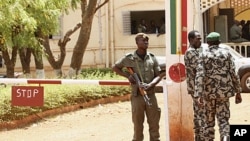The military government in Mali has announced an immediate restoration of the Constitution and says it will organize a return to civilian rule.
Some residents of Bamako called the junta leader’s declaration a turning point that gives hope that order will be restored and Mali will avoid harsh economic sanctions that were to go into effect Monday.
But the announcement was made in the shadow of the Tuareg rebels' advance on the ancient city of Timbuktu on Sunday. As journalists awaited the declaration of Captain Amadou Sanogo, one after another received calls from colleagues and relatives in Timbuktu, with accounts of explosions, gunfire and widespread looting.
The Tuareg Uprising
- Tuaregs are an ethnically Berber, nomadic people in West Africa's Sahel and Sahara regions.
- Tuareg fighters have staged multiple uprisings in Mali and Niger for greater autonomy.
- Current Mali rebellion began in January after Tuareg fighters returned from Libya, where they fought for Moammar Gadhafi.
- The conflict has driven about 100,000 Malians to neighboring countries, internally displaced more than 90,000.
- Losses to Tuaregs prompted soldiers' coup in Bamako Thursday March 22.
In his prepared statement, Captain Sanogo said the junta is “very concerned” about developments in the north and determined to defend at all costs Mali’s territorial integrity. But his main point was to announce the return to Constitutional rule.
He said, we make the solemn commitment to re-establish, from today, Mali’s 1992 Constitution and the institutions of the republic.
He went on to talk about elections.
He said considering the multi-dimensional crisis Mali is facing and in order to allow a peaceful transition and preserve national cohesion, the junta is committed, with the mediation of the regional bloc ECOWAS, to consult with all national actors to put transitional institutions in place and organize peaceful, free and democratic elections in which the junta will not participate.
Asked by a journalists who currently holds the presidency in Mali, Sanogo only replied “After the national convention.”
But the coup leader gave no timetable.
That is a concern, says the head of the International Crisis Group in West Africa. Gilles Yabi says Captain Sanogo’s statement is a step in the right direction and shows the fruits of the negotiations with ECOWAS, but it leaves many questions unanswered.
"There is a lack of clarity about the modalities of the transition and about the time when Captain Sanogo and the junta will actually relinquish power to a civilian government. So I think it is a method for the junta to buy some time."
Yabi said the more urgent challenge right now for ECOWAS is that armed groups are dividing the country by force.
"Now the immediate challenge is probably the situation in the north where basically the three administrative regions of Gao, Timbuktu and Kidal are now in the hands of the Tuareg rebels and other armed groups and that is really jeopardizing the integrity of Mali and it is very difficult to see how ECOWAS can respond to that challenge at the same time."
ECOWAS threatened severe economic sanctions if the junta did not begin to hand over power by Sunday. Diplomatic relations flew off track last Thursday when a delegation of West African heads of state aborted a trip to Bamako to meet with the coup leader, citing security concerns as pro-junta youth demonstrated at the airport.
But by Friday a junta delegation - not including Captain Sanogo - traveled to Burkina Faso to meet with ECOWAS-designated mediator President Blaise Compaoré. Burkina’s foreign affairs minister then came to Mali on Saturday for talks with the coup leader.
Soldiers ousted President Amadou Toumani Touré on March 22, denouncing what they called incompetence of the government’s response to the two-month-old rebellion.




